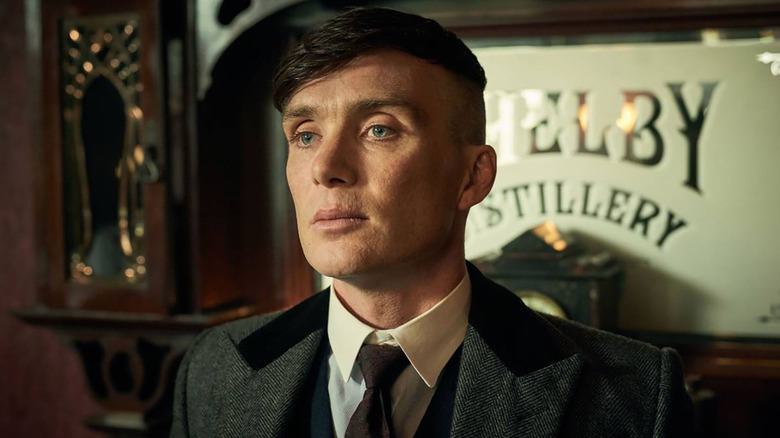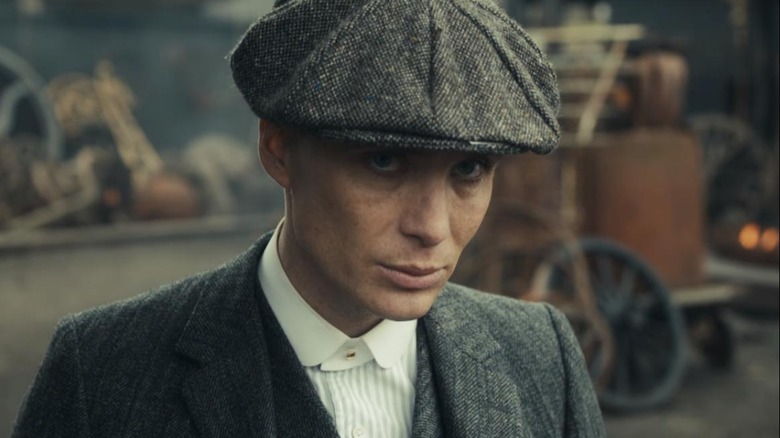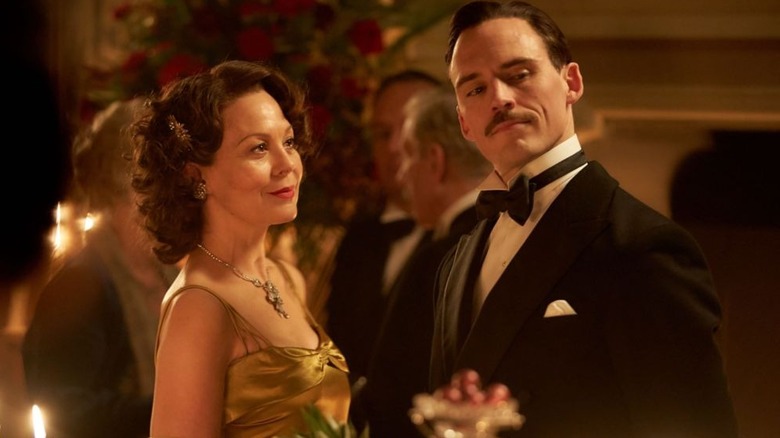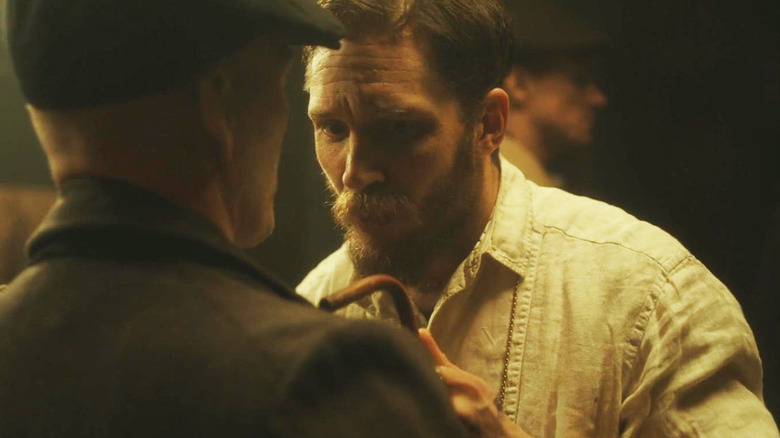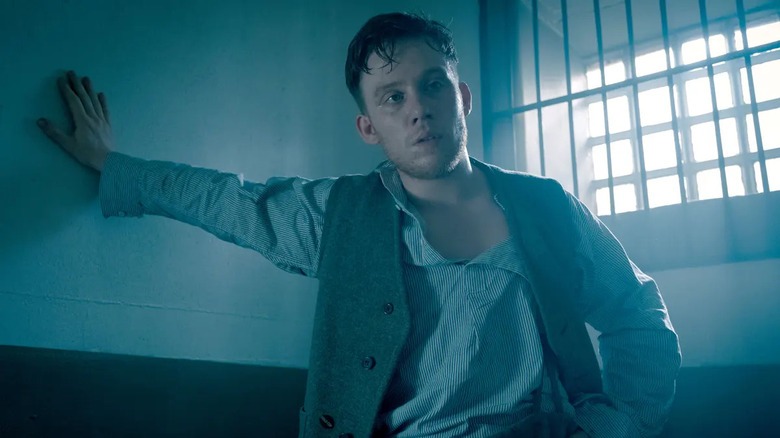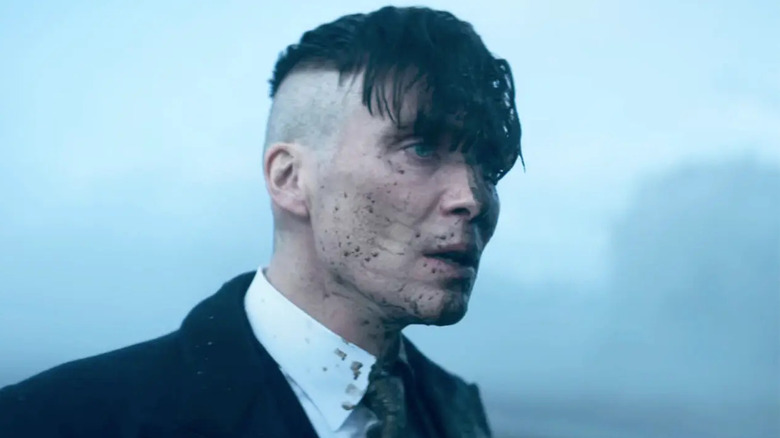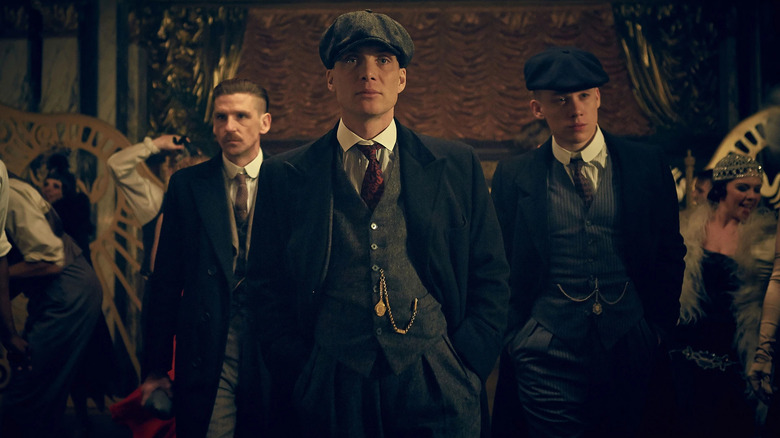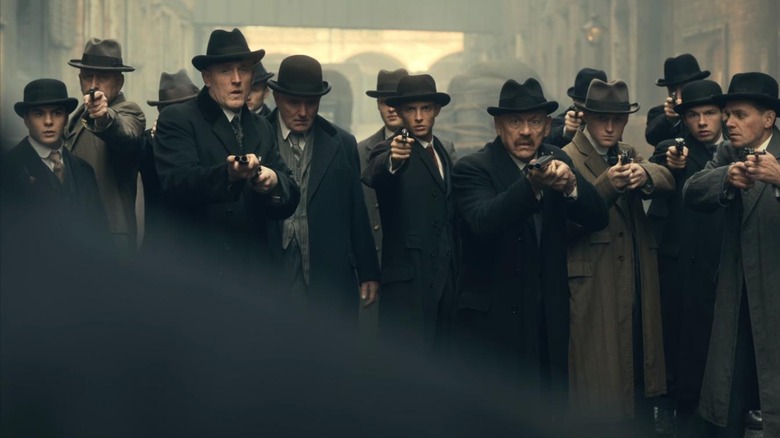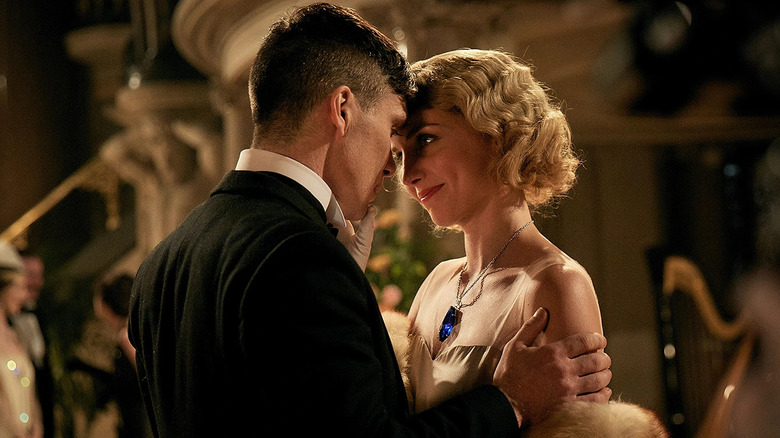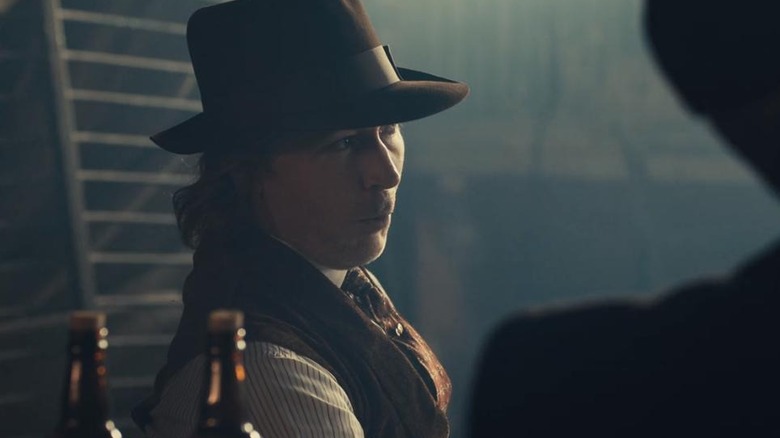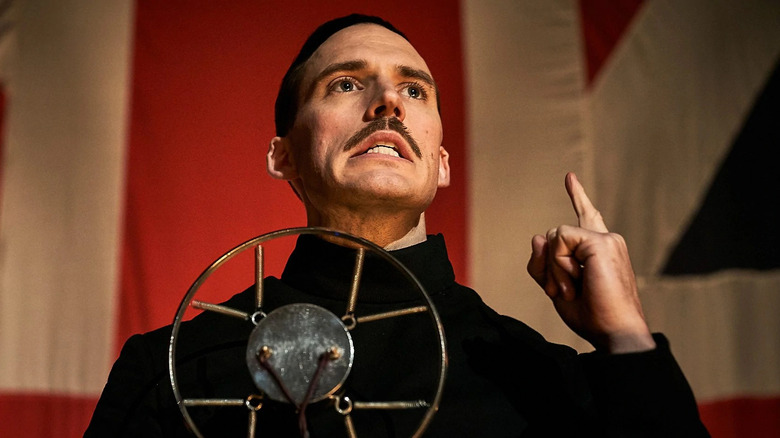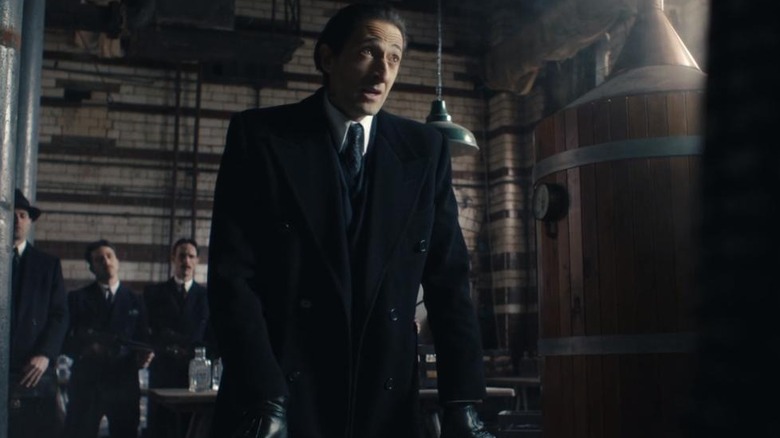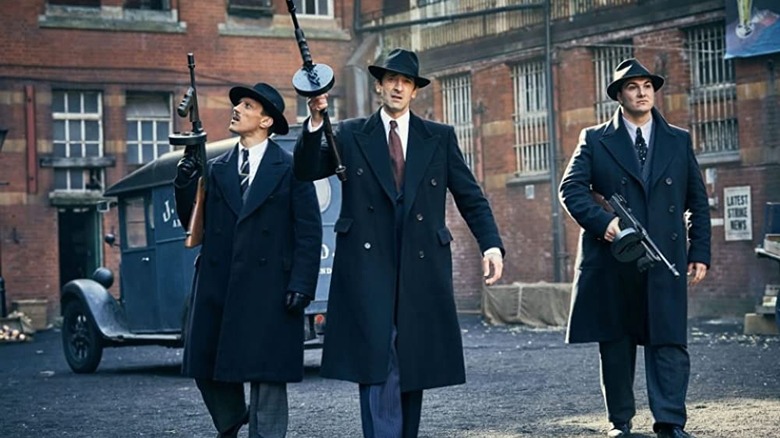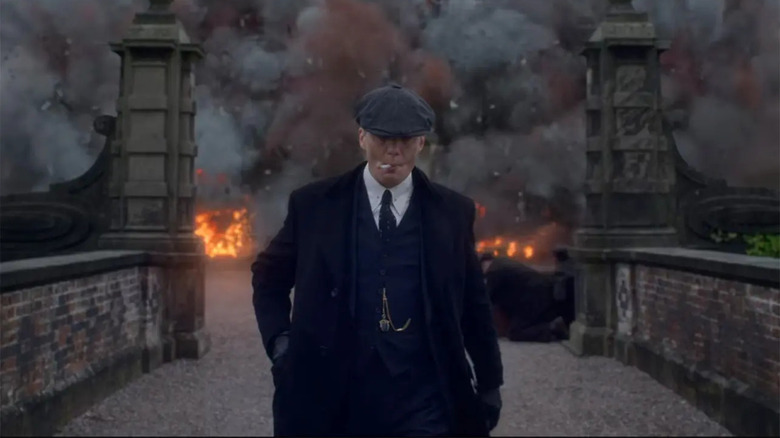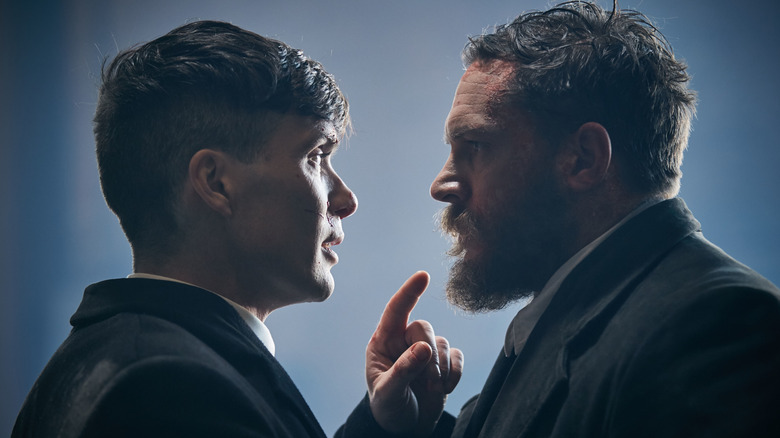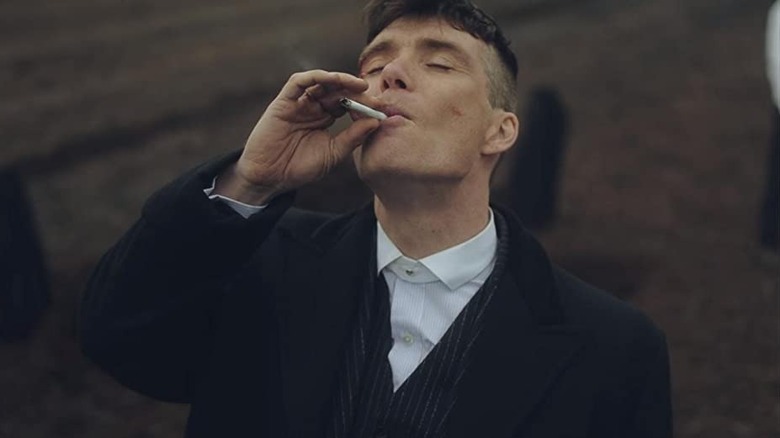The 15 Best Peaky Blinders Episodes, Ranked
The BAFTA award-winning drama series "Peaky Blinders" wrapped up its sixth and final season, which is streaming on Netflix. Thankfully, the final season was well worth the wait. "Peaky Blinders" gave a satisfying conclusion to each character's arc, but in the show's tradition, it didn't try to wrap things up too neatly. If you haven't checked out the series yet, then you have a new, bingeable television obsession in front of you. Similar to HBO's "The Sopranos," "Peaky Blinders" tells a gangster-centric story about a powerful crime family's fight to survive. Just don't blame us if you get completely addicted!
"Peaky Blinders" follows the Shelby family's rise to power in the years following World War I. Cillian Murphy takes on the lead role of the family's patriarch, Thomas "Tommy" Shelby. Tommy is a smart, cunning strategist, but even he gets in over his head when dealing with one of television's most fearsome rogues gallery. Here are the 15 best "Peaky Blinders" episodes, ranked.
15. Season 1, Episode 1
"Peaky Blinders" has always done a great job of setting a mood and atmosphere, and that was apparent during the very first episode. It's still very impressive how much the pilot accomplishes in its first hour. Considering the seasons are only six episodes each, "Peaky Blinders" didn't give itself much room to waste time. For the first installment of the series, this included taking on the difficult challenge of introducing the show's extensive cast of characters. It also had to establish the unique challenges that Tommy Shelby would undergo as a leader.
The episode brilliantly shows Tommy's cunning nature and sense of loyalty. After pretending to execute the traumatized veteran Danny (Samuel Edward-Cook), Tommy secretly transports him to London and welcomes him to the Peaky Blinders gang. This shows that Tommy remains haunted by his experiences in the war; he doesn't want to sacrifice a fellow soldier like Danny, because he knows exactly what he is going through. The first episode also marks the critical introduction of Tommy's love interest, Grace Burgess (Annabelle Wallis). Although Tommy doesn't like to show his emotions in public, he and Grace are instantly attracted to each other.
14. The Loop (Season 5, Episode 4)
The fifth season of "Peaky Blinders" was the show at its darkest. Although the series had introduced plenty of despicable villains, none are quite as terrifying as Oswald Mosley (Sam Claflin). Tommy describes him as "the devil," and given all of the baddies Tommy has faced, that is definitely saying something. In "The Loop," both Tommy and Mosley try to gain leverage over each other. They take turns revealing that they know secrets about each other's pasts. While "Peaky Blinders" has a lot of shootouts, seeing Cillian Murphy and Claflin just speak to each other is exciting in its own right.
"The Loop" also remembers that Tommy is still in mourning. He has never been the same since Grace's death, and he experiences haunting flashbacks throughout the episode. Tommy's leadership is in question; can he really lead the gang against the fascists if he doesn't have control over his own mind? "The Loop" is also a pivotal episode for Polly Gray (the late Helen McCrory). Polly has always been the most logical member of the family, and in "The Loop," it finally looks like she has a brighter future in front of her. Polly's love interest, Aberama Gold (Aidan Gillen), proposes to her, but like most couples on "Peaky Blinders," their relationship was never going to last. The tender scenes between Gillen and McCrory are a sharp contrast to Tommy's hallucinations and grief.
13. Season 2, Episode 3
Due to the way that the "Peaky Blinders" seasons are constructed, there tend to be many season finales and beginnings near the top of this list. Each season typically starts by introducing a new thorn in Tommy's side, and wraps up with a climactic confrontation with his latest opponent. However, that doesn't mean that all the episodes in between are simply filler. The third episode of the second season does a great job showing Tommy engaging in a battle of wits against his latest rival, the mobster Darby Sabini (Noah Taylor).
Sabini was a very different antagonist than Inspector Chester Campbell (Sam Neill) from the first season. While Campbell was a governmental figure who was attempting to bring Tommy and his gang to justice, Sabini was a street-level enemy who wasn't afraid to fight dirty. He was willing to cut corners like Tommy was, and in many ways, he was even more ruthless. In this episode, Sabini's men murder one of the Peaky Blinders' new recruits. Tommy's gang had hired the young boy, Harold Hancox, but when he is imprisoned, Sabini's goons take him out. Sabini's men strike again when Tommy and the gang take cousin Michael Gray (Finn Cole) home from a horse auction. Although Arthur (Paul Anderson) saves Tommy from being assassinated, it's clear that the war is just beginning.
12. The Noose (Season 4, Episode 1)
The end of the third season included one of the biggest cliffhangers in all of "Peaky Blinders." It wrapped up with Arthur, John (Joe Cole), Michael, and Polly all imprisoned, and set to be executed for their crimes. Given that the show was renewed for another season, fans could likely deduce that the Peaky Blinders would manage to escape somehow. However, they had to wait until the first episode of the fourth season, aptly titled "The Noose," to see how the gang manages to free themselves.
In the exciting opening sequence, Tommy comes in at the last minute with a pardon that saves their lives. The episode doesn't give them much time to celebrate, because it then flashes a year into the future. The family has now gone their separate ways. Arthur has apparently left his more volatile days behind him; he's held on a tight leash by his new wife, Linda (Kate Phillips). Michael has continued to amass power by profiting off of the cocaine business. Although Polly is usually the reliable voice within the family, she has become an addict, and essentially lost her ability to make logical decisions. The episode is more than just a "status quo" update on the characters' new lives. It sets up how far they've fallen apart, and the major threat that forces them to come back together.
If you or anyone you know is struggling with addiction issues, help is available. Visit the Substance Abuse and Mental Health Services Administration website or contact SAMHSA's National Helpline at 1-800-662-HELP (4357).
11. Black Day (Season 6, Episode 1)
The final season of "Peaky Blinders" had to deal with a difficult challenge that had nothing to do with the show itself. Although Polly was set up to be a major part of the final set of episodes, the great British actress Helen McCrory tragically passed away before the delayed production start of Season 6. It was absolutely heartbreaking for the cast, crew, and fans of the series. Not only was Polly set up for an exciting character arc in the show's conclusion, but McCrory's death meant that the show would be missing something. McCrory added something very special to "Peaky Blinders," and recasting her would not feel respectful.
Showrunner Steven Knight considered many options on how to incorporate McCrory's death into the show's narrative. He had initially considered making Polly canonically alive with the explanation for her on-screen absence that she had been sent on a mission to America. However, Knight realized that Polly was too important of a character to simply be written out of the main plot. He decided that Polly would be killed off in the series. Polly and a few of the Peaky Blinders' associates are murdered for their part in the staged assassination of Mosley, and her absence is intentionally felt throughout the remaining episodes.
10. Season 2, Episode 1
Although the first season of "Peaky Blinders" wasn't quite as narratively complex as the later seasons, it did end with a terrific cliffhanger that raised expectations for the next batch of episodes. In the final moments, Inspector Campbell confronts Grace at a railway station. A silent gunshot is heard, but it's unclear who was firing, and who was the victim. The next episode wastes no time in revealing what happened: Grace was the one with the weapon, and she flees the railway station after shooting Inspector Campbell.
The episode doesn't spend too much time exploring the aftermath, as it then flashes forward two years later to the Peaky Blinders' latest crisis. Their base of operations, The Garrison, is detonated in a mysterious attack. The gang suspects that the Irish are involved, so Tommy heads to The Black Lion to confront their rivals. However, the Irish aren't the only problem that Tommy has in front of him. The second season introduces a slew of new threats for the Peaky Blinders to face. Inspector Campbell is still alive, and has been promoted to the rank of major. Although Campbell hasn't forgiven Tommy, he has come to agree with Winston Churchill (Richard McCabe) that he might be more useful to the British government if he remains alive.
9. Season 1, Episode 6
The first season of "Peaky Blinders" goes out with a bang. Although the final cliffhanger was certainly a great hook to get fans interested in watching another season, the entire episode is packed with memorable moments that show the gang at the height of their powers. Although the Shelbys frequently quarrel, it's exciting to see them put their minds together to pull off a daring scheme. Danny, who Tommy saved in the first episode, returns to help the gang break Freddie Thorne (Iddo Goldberg) out of prison in one of the show's most exciting action sequences.
Freddie and Tommy have had their differences in the past, but the communist activist comes to Tommy's aid in the episode's climatic battle. The British gangster Billy Kimber (Charlie Creed-Miles) and his men surround and outnumber the Peaky Blinders. However, Freddie brings in the machine guns that were stolen to make things a fair fight. Although the stage is set for open war, only a few characters perish. Billy brutally shoots Danny, but Tommy gets his revenge by killing Billy.
8. Season 3, Episode 2
"Peaky Blinders" is known for its shocking moments, but the second episode of the third season boasts one of the most surprising twists in the show's history. In the previous episode, Tommy and Grace got married. It's rare to see Tommy content with anything, and his marriage to Grace suggested that he had a brighter path in front of him. However, Grace was always marked for tragedy. When the Peaky Blinders attend a charity function, a mysterious assassin within the crowd shoots Grace in the chest.
This scene is expertly handled, and shows how each of the characters would realistically react to the crisis. Finn, Arthur, and John immediately confront the assassin and mercilessly bludgeon him to death. However, Tommy doesn't take part in the violence for once. He cradles Grace and begs for her to stay alive. Cillian Murphy's performance is heartbreaking; Tommy is rarely vulnerable in public, but the loss of the one woman that he truly loves is enough for him to have a complete breakdown.
7. Heathens (Season 4, Episode 2)
The second season introduced one of the most fearsome antagonists in the history of the show: Luca Changretta. An Italian-American gangster with a personal vendetta against the Shelbys, Luca is the one character in the series who is as smart as Tommy. Luca was portrayed by Adrien Brody, the Academy Award-winning star of "The Pianist," and many other great films. Getting an actor of Brody's caliber to show up on "Peaky Blinders" signified that the show was in a class of its own. Brody completely captures the essence of a wicked mobster, who is willing to use any means necessary to get his revenge.
At the end of "The Noose," Luca and his men launched a surprise attack, leaving the fate of Michael and John unclear. "Heathens" reveals that while Michael survived the assault, John was killed, serving as a good decision for the trajectory of the series. Although John was an entertaining character, he hadn't been developed as thoroughly as Tommy and Arthur, and there was little more that he could do that would be interesting. Killing him off showed that Luca could hit the Shelbys and make it hurt, and signified that the series would continue to raise the stakes moving forward.
6. Mr. Jones (Season 5, Episode 6)
The fifth season of "Peaky Blinders" concludes with one of the show's most shocking series of events. The stage is set for Tommy's plan to work: he has strategized a way to assassinate Mosley when he is giving a speech. Tommy despises everything that Mosley represents, and he hates the fact that he has to stand in support of him. Unfortunately, anyone that knows history realized that the Peaky Blinders' plan was doomed from the start. Oswald Mosley was a real historical figure, and he did not die in real life until 1980.
"Mr. Jones" uses these facts as an effective storytelling device. Clearly, something was bound to go wrong, and the episode creates tension as it ramps up to the assassination attempt. Barney (Cosmo Jarvis) and Aberama are swiftly killed by Mosley's men as they sneak around the gathering. It was sad to see Aberama killed in such a brutal fashion, as he had just gotten engaged to Polly.
5. The Company (Season 4, Episode 6)
"The Company" ended with a moment that "Peaky Blinders" fans almost definitely didn't see coming: it has a happy ending! Of course, this victory for the Shelbys only arrives after a hard-fought battle. The opening sequence is one of the most suspenseful in the entire run of the series. As the Peaky Blinders gather for a boxing match, it appears that Arthur might be killed. Arthur had been a part of the show since the beginning, but this was the season that also saw the death of John. Could the Shelby family survive another tragic loss?
Thankfully, Arthur's death is faked, and he returns at just the right moment to kill Luca, ending Adrien Brody's excellent run on the series. It's a satisfying moment that gives the Shelbys a second to celebrate. Additionally, after receiving a critical piece of information from Alfie (Tom Hardy), Tommy uses the leverage to gain political power and he is elected as a member of parliament.
4. The Duel (Season 4, Episode 5)
The fourth season of "Peaky Blinders" is arguably the show's best. While it's easily the most action-packed period in the series, it also demonstrates the strategic techniques that Tommy has to utilize in order to take down the Changrettas. Tommy nearly comes to blows with Luca, but their fight is stopped by the police. Luca has another evil plot in mind, and he heads to London to discuss assassinating Arthur at a boxing match with the Jewish gangster, Alfie.
Fans of Christopher Nolan's "The Dark Knight" trilogy may have enjoyed getting to see Tom Hardy's return to the series in the previous episode, "Dangerous." Would "Peaky Blinders" provide the Bane/Scarecrow team-up that had been missing in "The Dark Knight Rises?" Alfie is one of the most entertaining characters in the series because it's never clear where his loyalties lie. Hardy has fun with the eccentric and unpredictable character, and Alfie's vague affiliations create suspense before the next episode.
3. Lock and Key (Season 6, Episode 6)
The series finale had a lot to live up to. Between Michael's operation, the fascists, and Tommy's personal illness, the Peaky Blinders had been dealing with a lot in the final stretch of episodes. Instead of ending with an epic, "Game of Thrones" style open battle, "Lock and Key" isolates the action to a few shootouts. These suspenseful sequences were perfect for the tone of the series, as it felt like many of the beloved characters could be killed at any moment.
Arthur is pinned down in Garrison Lane by the IRA assassins, but he manages to elude and kill them, allowing him to avenge Polly's death. In a drawn-out sequence, Tommy confronts Michael for his crimes against the family. Once again, Polly's prediction comes true: Michael is killed by Tommy, and his companions are detonated by an IRA bomb. The end of the episode teases that Tommy may take his own life before he succumbs to his supposed illness. However, Tommy realizes the diagnosis was fake, so he ultimately sets off on another adventure.
2. Season 3, Episode 6
Tommy had a rough go of it in the third season. After losing Grace, he's faced with another potential tragedy when his son, Charles, is kidnapped by the evil Father Hughes (P. Considine) and his goons. British comedy fans may have been excited to see Considine show up, but he's clearly nothing like Steven Price from "The World's End." Kidnapping a child isn't even the evilest thing that Hughes does during his run on "Peaky Blinders." Hughes uses Charles as leverage so Tommy will detonate a train bomb.
Tommy manages to get revenge by sending Michael to kill Hughes. Michael has steadily grown into a darker character, and he proves his merits within the gang. It appears that the Shelbys might come out on top after they rob the Russians. However, the family (minus Tommy) is taken away in handcuffs in the final moments when the police show up, ending the finale with the family members who feel betrayed turning on Tommy.
1. Season 2, Episode 6
"Peaky Blinders" has a ton of great characters, but it really is Tommy's story. The show is at its best when Tommy has to reckon with potentially losing his life. In the second season finale, Tommy begins to settle the family business in case he is killed. This reveals how Tommy values his family more than his own life, and he's willing to make the ultimate sacrifice. However, Tommy is ultimately spared when he receives some unexpected assistance from Winston Churchill.
The episode also includes an incredibly satisfying moment where Polly kills Inspector Campbell. Campbell had assaulted Polly earlier in the season, so it was cathartic to see her get revenge. However, Polly is still left to wonder about her son's future when Michael officially declares that he wants to join the Peaky Blinders. Michael has steadily grown accustomed to Tommy's lifestyle, and he's finally prepared to officially contribute to the family business, adding to the tension and intrigue of this stellar episode.
